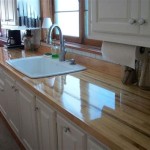Can You Seal Marble Countertops?
Marble is a stunning natural stone that adds elegance and sophistication to any kitchen or bathroom. However, its beauty comes with a price: it is porous and susceptible to staining. Sealing marble countertops is crucial for protecting them from everyday wear and tear and preserving their pristine appearance. This article explores the importance of sealing marble countertops, the different types of sealants available, and the process of sealing.
Why Sealing Marble Countertops is Essential
Marble is a porous material, meaning it has tiny openings on its surface that can absorb liquids. This porosity makes marble vulnerable to stains from common household substances such as wine, coffee, oil, and acidic juices. Sealing marble countertops creates a protective barrier that prevents these liquids from penetrating the stone's surface, minimizing the risk of staining.
Beyond stain prevention, sealing marble countertops also enhances their durability. The sealant forms a protective layer that resists scratches, chips, and abrasion, extending the lifespan of the countertops. This is particularly important in high-traffic areas where the countertops are subjected to frequent use.
Types of Sealants for Marble Countertops
There are two primary types of sealants for marble countertops: penetrating sealants and topical sealants.
Penetrating sealants, also known as impregnating sealants, are absorbed into the pores of the marble. They create an invisible barrier that repels liquids while allowing the stone to breathe. These sealants are generally preferred for marble countertops as they provide long-lasting protection without altering the natural appearance of the stone.
Topical sealants form a film on the surface of the marble. They offer a higher level of protection against stains and scratches but can sometimes change the sheen or color of the stone. Topical sealants may be suitable for marble countertops that require a higher level of protection but are not ideal for preserving the natural beauty of the stone.
The Sealing Process
Sealing marble countertops is a relatively straightforward process that can be done by a homeowner with the right tools and materials. The steps involved include:
1.
Cleaning the surface:
Begin by thoroughly cleaning the marble countertops with a pH-neutral cleaner. This removes any dirt, grime, or residues that could interfere with the sealant's adhesion.2.
Applying the sealant:
Apply the sealant evenly to the entire surface of the countertops using a soft cloth or a brush. Follow the manufacturer's instructions for the application time and drying time.3.
Buffing the surface:
Once the sealant has dried, buff the surface with a soft cloth to remove any excess sealant and create a smooth finish.The frequency of resealing depends on the type of sealant used and the amount of traffic the countertops receive. Most penetrating sealants last for several years, while topical sealants may require resealing every 12 to 18 months.
While sealing marble countertops can be done by homeowners, it is always advisable to consult with a professional for more complex sealing projects or for countertops that have already experienced staining or damage. A professional can assess the condition of the countertops and recommend the most appropriate sealant for the specific application.

How To Treat Seal Granite Marble Countertops Lesher

How To Choose A Marble Countertop Sealer Diy Guide

How Often Should I Seal My Marble Countertops Team One

What You Need To Know About Sealing Your Marble Countertops Granite 4 Less

How To Seal Marble Counters Clean Stone Care

How To Treat Seal Granite Marble Countertops Lesher

How To Seal Marble Countertops A 5 Step Guide Sk Stones Usa

Residential Stone Countertop Sealing Sir Grout Of The Lowcountry

Residential Stone Countertop Sealing Sir Grout Chicago

How To Treat Seal Granite Marble Countertops Lesher
See Also








